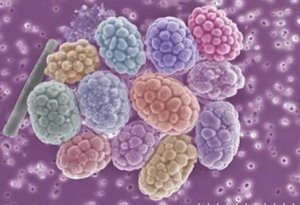Maximizing microbiome knowledge
Carolina faculty members are excited about the opportunities a new White House initiative, which funds research, presents.
Microbiomes – communities of diverse microorganisms that live together in different environments – are invisible to the naked eye. But these communities play an enormous role in maintaining the health of ecosystems found in plants and soils, the ocean and atmosphere, and systems within the human body, like our digestive track.
The White House Office of Science and Technology (OSTP) recently announced a new National Microbiome Initiative to advance research into microbiome behavior and function. The effort promises to yield not just a better understanding of our natural world, but also insights into how microbiomes can be tapped to improve the health of humans, plants, animals and ecosystems. Although there are tens to hundreds of millions of different types of microbes, there is little current understanding of how they interact in communities or with their environments and the different disciplines that study the microbes in humans, animals, plants and the environment tend to be disconnected.
“We live in a microbial world,” said Jeff Dangl, a biology professor at UNC-Chapel Hill, Investigator of the Howard Hughes Medical Institute, and co-author of several key journal articles that have helped fuel the OSTP initiative. “You would not be alive today were it not for the microbes in the ocean that provide half of your oxygen, microbes in soil that make production of food possible and microbes in your gut that help you break down that food and help you fight off infection.”
The White House initiative will fund research into unanswered questions common to all microbiomes. It will also fund better tools to study microbiomes and create opportunities for industry to commercialize discoveries. It aims to achieve coordinated research – linking scientists who study plant microbiomes with those studying human and environmental systems, and drawing in bioinformatics and data scientists essential to this area of research.
Sound familiar? It should, because that type of work fits squarely within UNC-Chapel Hill’s core research strengths. Faculty at Carolina are already leaders in these fields and are excited about the opportunities the new OSTP initiative could provide.
“We need to mine the wealth of knowledge and depth of experience already present at UNC – the exceptional faculty, staff and students conducting cutting-edge research on microbiomes from many different environments – by unifying it with a larger vision,” said Adrian Marchetti, UNC professor of Marine Science. “This federal initiative may be the catalyst for us to do so.”
To keep reading, click here.





